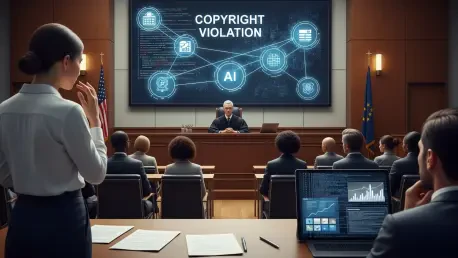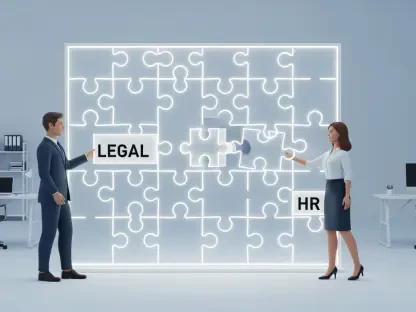I’m thrilled to sit down with Desiree Sainthrope, a distinguished legal expert with a wealth of experience in drafting and analyzing trade agreements. With her deep knowledge of global compliance and keen interest in the intersection of law and emerging technologies like AI, Desiree is the perfect person to shed light on the ongoing legal battle between OpenAI and media companies over ChatGPT conversation records. Today, we’ll dive into the nuances of this case, exploring the clash between copyright claims and user privacy, the potential ramifications for AI regulation, and the broader implications for transparency and trust in AI technologies.
Can you walk us through the core issues of this legal dispute between OpenAI and media companies?
At its heart, this case revolves around allegations from several major media companies that OpenAI used their copyrighted news content to train its language models, like ChatGPT, without permission. These companies are seeking access to 20 million ChatGPT conversation records to investigate whether their material was reproduced or improperly utilized. It’s a complex issue because it pits intellectual property rights against data privacy concerns, with a court order pushing OpenAI to release anonymized data, while the company resists due to fears of breaching user trust.
What are the primary reasons OpenAI is resisting the court’s demand to disclose these records?
OpenAI’s resistance is largely grounded in privacy and security concerns. They argue that handing over millions of user conversations—even if unrelated to the lawsuit—could violate the privacy promises they’ve made to users. Their legal team has called this request a “fishing expedition,” suggesting it’s overly broad and lacks specific evidentiary value while posing significant risks of data misuse, even if anonymized. They’re worried this could set a dangerous precedent for AI companies globally, undermining confidence in the security of AI systems.
How are the media companies justifying their push for access to these ChatGPT logs?
The media companies argue that they need these logs to substantiate their claims of copyright infringement. They believe the conversation records will reveal whether ChatGPT has generated content that mirrors their copyrighted works, helping them quantify the extent of any unauthorized use. To address privacy concerns, they’ve proposed that the data be anonymized, asserting that this should sufficiently protect user identities while allowing them to build their case. They view OpenAI’s objections as a delay tactic rather than a genuine concern.
If the court rules in favor of the media companies, what might be the broader impact on the AI industry?
A ruling against OpenAI could have a ripple effect across the AI sector. It might compel other AI companies to disclose massive amounts of user-generated content in similar lawsuits, raising the stakes for data handling practices. Beyond that, it could reshape how copyright law is interpreted in the context of AI-generated outputs, potentially leading to stricter regulations or new legal frameworks. This might force companies to rethink how they source and use training data, possibly stifling innovation if the compliance burden becomes too heavy.
Conversely, what could happen if the court sides with OpenAI in this dispute?
If OpenAI prevails, it could establish a stronger shield for tech companies against demands for data disclosure in future legal battles. This might reinforce privacy protections for users, as courts could be more hesitant to mandate the release of personal data, even if anonymized. It would likely embolden AI firms to prioritize user confidentiality, potentially setting a precedent that balances innovation with privacy rights, though it might also make it harder for copyright holders to prove infringement in AI-related cases.
Why is this case being seen as a pivotal moment for AI transparency and privacy standards?
This dispute is considered a landmark because it’s one of the first major cases to directly confront the tension between transparency in AI systems and the protection of user data. The outcome could influence global AI regulations by either pushing for greater data access in legal contexts or cementing stricter privacy norms. It’s being watched closely by policymakers and industry leaders alike, as it may define how much insight regulators and litigants can demand into AI operations without compromising the confidentiality that users expect.
How do you think this legal battle might shape public perception of AI tools like ChatGPT?
Public trust in AI technologies could take a hit, especially if users start worrying that their interactions—however anonymized—might be exposed in legal proceedings. Even the perception of reduced privacy could make people more cautious about using these tools for sensitive or personal matters. On the flip side, if OpenAI successfully defends its stance, it might reassure users about data security. Either way, this case could push companies to be more transparent in communicating their privacy policies, clarifying how user data is handled and protected.
What is your forecast for the future of AI regulation in light of cases like this one?
I anticipate that cases like this will accelerate the development of more nuanced AI regulations worldwide. If disclosure becomes the norm, we might see jurisdictions imposing stricter oversight on how AI models are trained and what data they can access, potentially harmonizing rules across borders. However, if privacy wins out, there could be a push for robust data protection laws specific to AI, balancing innovation with user rights. Either way, this case is likely to be a catalyst for defining clearer boundaries around data use, copyright, and privacy in the AI space, shaping the industry’s trajectory for years to come.









